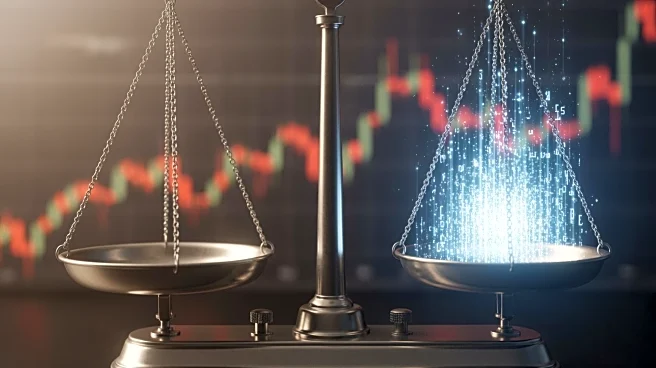What's Happening?
During CNBC's 'Lighting Round,' Jim Cramer advised investors against purchasing Doximity stock, citing its high valuation as a concern. Cramer expressed a preference for waiting before investing in Doximity,
suggesting that the stock is currently too expensive. He also commented on other stocks, recommending selling half of IREN and expressing caution about Boise Cascade due to its exposure to the housing market. Cramer's insights reflect his cautious approach to investing in stocks with high valuations or those affected by broader economic conditions.
Why It's Important?
Cramer's advice highlights the importance of valuation in investment decisions, particularly in the tech sector where stocks can be prone to overvaluation. His caution regarding Doximity underscores the need for investors to consider market conditions and company fundamentals before making investment choices. The mention of Boise Cascade's reliance on the housing market further illustrates the impact of economic factors, such as interest rates, on stock performance. Cramer's insights serve as a reminder for investors to remain vigilant and informed about market dynamics and economic indicators.
What's Next?
Investors may heed Cramer's advice by reassessing their portfolios and considering the potential risks associated with high valuation stocks. The broader market may experience shifts as investors react to economic indicators, such as potential interest rate changes by the Federal Reserve. Companies like Doximity may need to demonstrate strong growth prospects and solid fundamentals to justify their valuations and attract investor interest. The housing market's influence on stocks like Boise Cascade may prompt investors to monitor economic policies and housing trends closely.
Beyond the Headlines
Cramer's cautionary stance on Doximity reflects broader concerns about tech stock valuations in an environment of economic uncertainty. The interplay between interest rates and housing market performance highlights the interconnectedness of economic policies and sector-specific challenges. Investors may need to balance short-term market reactions with long-term investment strategies, considering both macroeconomic factors and individual company performance. Cramer's insights offer a perspective on navigating investment decisions in a complex and dynamic market landscape.









